Jan 2010
Jan 2010 sadmin2010 WORLD CUP A RARE SOUTH AFRICAN INVENTION
2010 WORLD CUP A RARE SOUTH AFRICAN INVENTION sadmin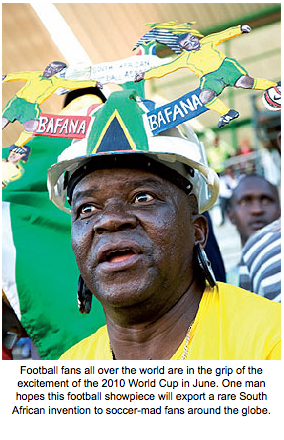 South Africa's latest 'export product' will be in the form of the popular hat worn by South African soccer fans known as the 'makarapa'. This hard hat was originally used as protection for miners and construction workers.
South Africa's latest 'export product' will be in the form of the popular hat worn by South African soccer fans known as the 'makarapa'. This hard hat was originally used as protection for miners and construction workers.
Protection
It all started with an incident at a soccer match in 1979 when a fan was hit by an object thrown by excited fans. Kaizer Chiefs supporter, Alfred "Magistrate" Baloyi thought that the soccer fan would not have been injured if he wore a protective hat.
When a construction worker friend gave him a hard hat to wear at future matches, he decided to decorate it. Baloyi, who has a natural talent for art, painted his helmet in the black and yellow colours of Kaizer Chiefs. No sooner, had he started wearing his colourful hat, when other soccer fans asked him to make similar hats for them.
More and more fans started wearing hats decorated in the colours of their favourite teams. Since then, the makarapa has become a permanent feature at South African football games.
Decorations range from simple painted designs to stand-up cut-outs of players, teams or animals. This is often combined with giant false spectacles, miniature soccer balls or horns.
Artist
Baloyi, who comes from Limpopo, now works as a municipal bus cleaner in Johannesburg. His nickname "Magistrate" comes from the colourful gold and black robes he wears to every game of his favourite team, Kaizer Chiefs.
"I have never seen the door of an art school - drawing and painting just came naturally to me," he says.
"At first I only painted the helmets, but I started experimenting by adding horns, like goats' horns. I then decided to start cutting out pictures of players and putting them on the helmets."
Opportunity
With the World Cup approaching, Baloyi saw an opportunity to sell his unusual hats to visiting soccer fans.
"This being the first World Cup in Africa, visiting football fans have to take home something to remind them of Africa and my makarapas are the perfect souvenirs," says Baloyi. He has already teamed up with Grant Nicholls, who runs a local sports marketing company. They are looking at the best way to market the helmets and to help underprivileged South Africans by teaching them the skills to make similar hats.
Baloyi crafts a "signature" hand-made range, usually on commission for fans. You don't necessarily have to buy one, you can just be creative and make your own.
- Mbulelo Baloyi
2010 WORLD CUP GIVING THEIR TIME, TALENT AND SKILLS
2010 WORLD CUP GIVING THEIR TIME, TALENT AND SKILLS sadmin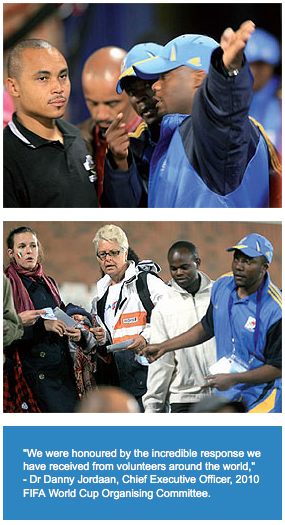 The huge task of training the 15 000 selected volunteers for the 2010 World Cup is set to begin in February. As the 'face' of the World Cup, these volunteers will give their time, talents and skills to make the World Cup a success.
The huge task of training the 15 000 selected volunteers for the 2010 World Cup is set to begin in February. As the 'face' of the World Cup, these volunteers will give their time, talents and skills to make the World Cup a success.
Volunteers, who work free of charge to make the event a success, are a vital part of any FIFA World Cup. Volunteering is not only a great way of being part of the biggest sporting event in the world; it is also about developing skills and helping to develop a culture of community service in South Africa.
Overwhelming response
overwhelming response from all over the world. A total of 67 999 people from 170 countries applied. During the application period from 20 July 2009 to 31 August 2009, an average of 1 600 applications were received per day.
Some of the volunteers have already taken part in volunteer work during the Final Draw for the 2010 FIFA World Cup held in Cape Town in December last year.
The applications that were received, were for the Final Draw, as well as for the World Cup and for the Football for Hope Festival in Johannesburg. The festival will run at the same time as the World Cup this year.
Other countries
The highest number of applications outside of the host country was from Nigeria with a total of 750. The United States of America followed with 554 applications and Brazil was close behind with 489. There were 449 applications from Zimbabwe and 414 from Italy. Other African countries that responded were Cameroon with 375, the Democratic Republic of Congo with 109 and Lesotho with 106.
Locally, Johannesburg came in with the most applications receiving a total of 16 280 for Soccer City and Ellis Park. Pretoria received 8 496 applications, followed by Nelson Mandela Bay with 7 365. Cape Town received 5 998 applications, with Nelspruit and Rustenburg close behind receiving 5 781 and 5 558 respectively. Durban received 5 148 applications, Polokwane received 5 503 and Bloemfontein received 4 371.
Sign language
To the call for volunteers with sign-language skills, 83 applicants applied to help people who have hearing problems.
All the successful applicants will be trained in their respective fields between February and May this year.
- Mbulelo Baloyi
2010 WORLD CUP INSPIRING ALL OF AFRICA
2010 WORLD CUP INSPIRING ALL OF AFRICA sadmin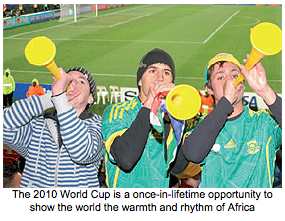 "From Cape to Cairo, Africa must stand together as never before to create a sweet chorus singing the same song in perfect harmony. The 2010 FIFA World Cup must be Pan-African in word and deed as South Africa stages a tournament that inspires all of Africa." - Dr Irvin Khoza, Chairman 2010 FIFA Organising Committee.
"From Cape to Cairo, Africa must stand together as never before to create a sweet chorus singing the same song in perfect harmony. The 2010 FIFA World Cup must be Pan-African in word and deed as South Africa stages a tournament that inspires all of Africa." - Dr Irvin Khoza, Chairman 2010 FIFA Organising Committee.
The 2010 ball has started rolling in full force and the World Cup is right on our doorstep. But this World Cup does not belong to South Africa alone, it belongs to all of Africa. With less than five months before the opening match on 11 June at the Soccer City Stadium, we must all stand together to make it the greatest showpiece that Africa can offer.
So, let us as South Africans inspire the whole of Africa by being proudly African. Let us take action to help build up excitement through things that tell the world we are proud to be African.
Pride and unity
The 2010 National Communications Partnership (NCP) was formed to oversee and drive messages for the 2010 World Cup. The role of the NCP is to inform the public about 2010 events, market South Africa and inspire a sense of pride and unity among the South African public.
Our beautiful flag
As the eyes of the world are upon us, we can support the NCP's efforts in many ways.
We can start by flying our beautiful flag with pride. The NCP plans to hand out more than 47 million South African flags leading up to the start of the World Cup.
"Our national flag is a powerful symbol of unity and pride, and we would like to play our part by encouraging South Africans to proudly fly the flag ," says Margaret Dingalo, Stakeholder Relations Manager for the IMC.
Welcome the world
We can also welcome the world by doing the diski dance. At the launch of the Football Friday campaign, Deputy President Kgalema Motlanthe urged all South Africans to learn the diski dance as part of welcoming the world in a celebratory way.
Like the vuvuzela and the makarapa (a decorated hard hat), the diski dance is a first for South African football. The dance borrows much of its style from the 'beautiful game'.
The 2010 World Cup mascot, Zakumi, is set to bring a sense of fun to the World Cup. As the build-up to the World Cup gains speed, Zakumi, will help to fire up support and enthusiasm. So support and encourage him.
He will be spotted throughout the country talking to people and encouraging them to support the World Cup.
Be part of it all
The 2010 World Cup is a once-ina-lifetime opportunity to show the world the rhythm and warmth of Africa. So don't miss out - choose to be part of it all by being a champion for our country and for Africa.
- Mbulelo Baloyi
2010 WORLD CUP LASTING BENEFITS BEYOND 2010
2010 WORLD CUP LASTING BENEFITS BEYOND 2010 sadmin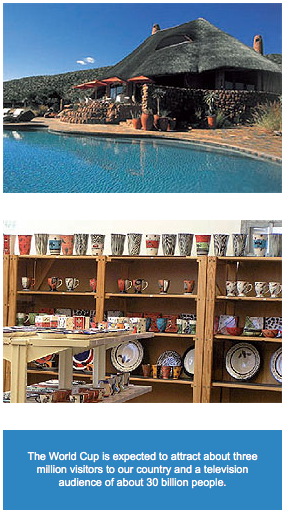 The year 2010 will see millions of soccer fans from all over the world visiting our country. It is a landmark year that many South Africans have been looking forward to with expectations to host the best ever FIFA World Cup. But the real and meaningful benefits of hosting the world's largest sporting event will only come after 2010...
The year 2010 will see millions of soccer fans from all over the world visiting our country. It is a landmark year that many South Africans have been looking forward to with expectations to host the best ever FIFA World Cup. But the real and meaningful benefits of hosting the world's largest sporting event will only come after 2010...
This will be the first ever African FIFA World Cup and the biggest sporting spectacular in the world. South Africa's successful hosting of the FIFA Confederations Cup, the DLF Indian Premier League and the British Lions Tour last year, re-confirmed the country's readiness to host the World Cup.
The World Cup gives South Africans a once-in-a-lifetime chance to showcase our country as a tourism destination. This includes our people, our natural and cultural heritage and our world-class infrastructure. One of the lasting benefits of the World Cup, is that all of these things fill us all with a sense of pride, which encourages social unity and patriotism.
Economy
The World Cup is expected to attract about three million visitors to our country and a television audience of about 30 billion people. This exposure will provide an unmatched opportunity to market our country as a wonderful place for tourists to visit.
Tourism resulting from the World Cup will bring about R15,6 billion into the country. The World Cup will contribute a further R50 billion to the economy from construction investment alone.
Investment
Between 2006 and this year, the public sector has invested a lot of money in things like stadiums, transport, telecommunications, safety and security and infrastructure for ports of entry. Billions have also been invested in hotel and resort developments by the tourism industry.
All these investments will leave a lasting legacy long after 2010. In addition, the hosting of the World Cup has brought many opportunities for small businesses and emerging tourism entrepreneurs.
Continued growth
A modern public transport system - in the form of the Bus Rapid Transit (BRT) system and the Gautrain rapid rail link - is seen as one of the most important legacies that will benefit South Africans long after the World Cup.
In addition to this, the police is increasing its permanent staff from 55 000 to over 190 000. Police reservists will be increased from 45 000 to 100 000 by this year. South Africa has also upgraded its broadcast network. This includes a R1 billion switch-over from analogue signal to digital terrestrial television (DTT) and an upgrade of telecommunications infrastructure. Growth can be expected to continue after the tournament.
- Mbulelo Baloyi
2010 WORLD CUP LEARN THE AFRICAN 'DISKI'
2010 WORLD CUP LEARN THE AFRICAN 'DISKI' sadmin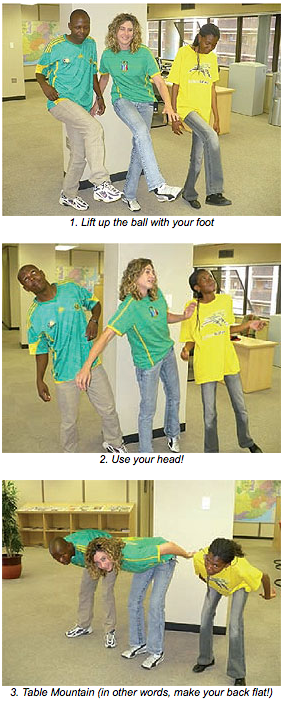
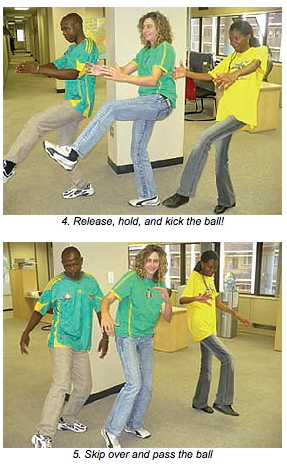
First, everybody did the moonwalk dance, then the macarena. The Mexican wave is also now a feature of all sporting events. South Africa is set to get the world jiving to an African rhythm with the diski dance to celebrate the first ever FIFA World Cup on the African continent.
The diski dance is set to get thousands of football fans moving to an African beat during the World Cup in June and July.
'Diski' is a popular slang word for football in South African townships. The dance is made up of a series of football moves with an imaginary soccer ball. With the diski dance, the 2010 National Communications Partnership (NCP) aims to fire up excitement ahead of the World Cup.
Excitement
A 60-second television advertisement showing how the diski dance is done, is already being shown on major television networks worldwide. These include BBC World, CNN International, Sky, EuroSport and Fox. The television advertisement will reach more than 600 million viewers between now and kick-off.
The aim is to let this dance spread to the whole of Africa. It should be to 2010 what the Mexican wave is to sport: a display of unity and celebration by people from all over the world. By learning to do the diski dance, you will start feeling the rhythm of African football, as well as the energy and passion the world is going to see at the 2010 World Cup.
- Mbulelo Baloyi
2010 World Cup Zakumi representing the spirit of Africa
2010 World Cup Zakumi representing the spirit of Africa sadmin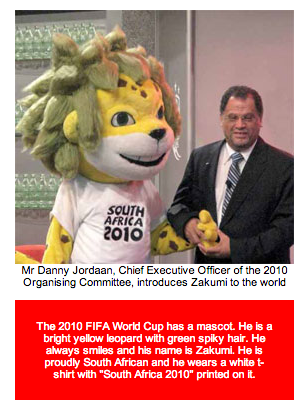
BRINGING HEALTHCARE UP TO STANDARD
BRINGING HEALTHCARE UP TO STANDARD sadminOne of government's main priorities over the next five years, is to provide better healthcare for all South Africans. To achieve this goal, many health facilities throughout the country will be getting a face lift. The Department of Health has identified a number of facilities that will be upgraded to bring them in line with national health standards.
Six priority areas where improvements can be made within the country's healthcare sector were identified.
These include ensuring the safety of patients, preventing and controlling infections, improving the availability of medicines, reducing waiting times for patients, improving cleanliness and creating a positive and caring attitude among health workers.
So far, 514 projects in the public sector and 137 quality improving projects in the private sector have been started. An important part of the campaign will be to improve the skills of healthcare workers throughout the system. About 60 percent of complaints received by the Health Professions Council of South Africa is not about clinical care but, about poor skills, poor management and attitudes of staff.
"We will build on what already exists, invest in sharing lessons across a learning network and empower supervisors and managers to be able to coach and mentor those they support," said Deputy Health Minister, Dr Molefi Sefularo.
- BuaNews
For more information about news items featured on this page, call 1020
CALL FOR NOMINATIONS
CALL FOR NOMINATIONS sadminNational Orders are the highest form of recognition that a country bestows on deserving citizens. The President as the Grand Patron of the National Orders, awards these orders, which are inclusive and represent all South Africans. Download and print the nomination form here...
CARTOON STRIP EPISODE 3: IMBIZO JUNCTION OUR YOUTH, OUR FUTURE
CARTOON STRIP EPISODE 3: IMBIZO JUNCTION OUR YOUTH, OUR FUTURE sadmin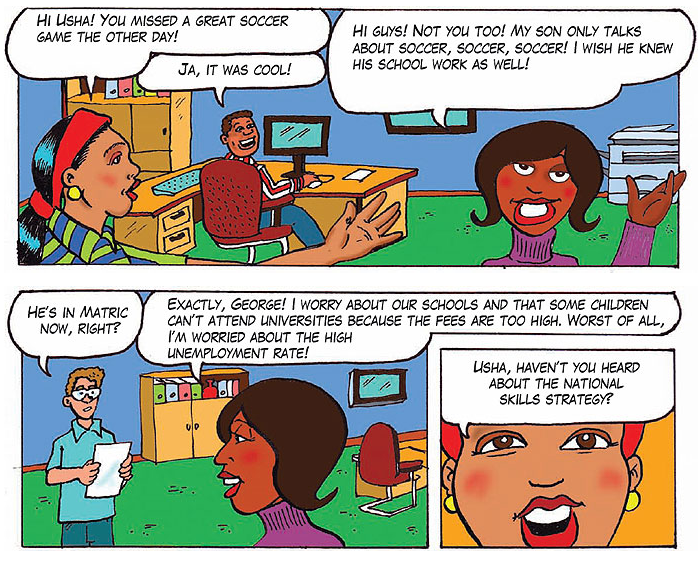
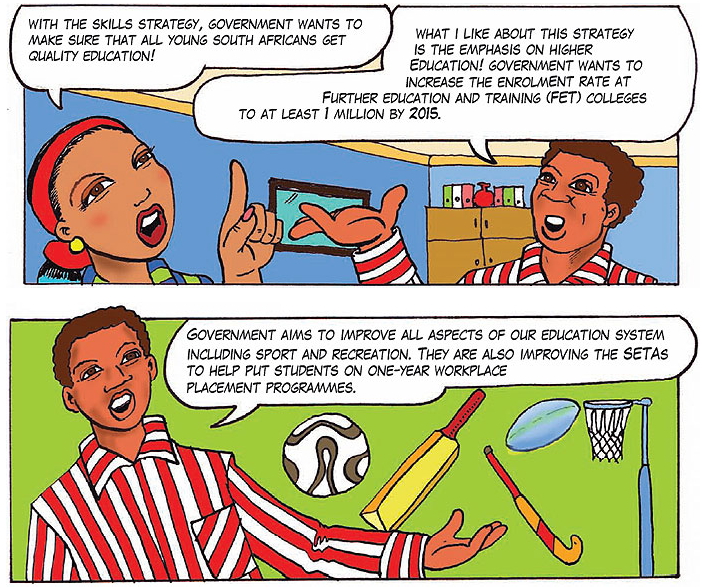
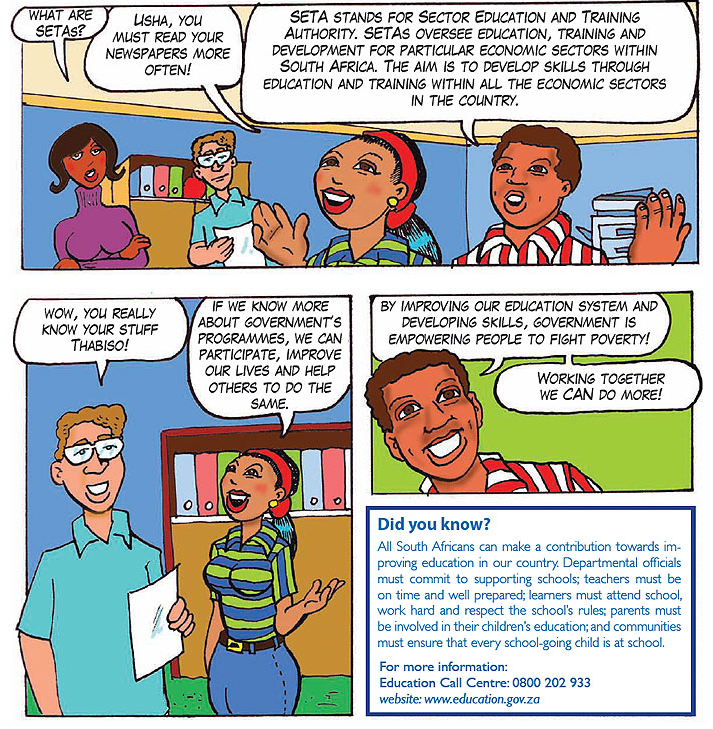
CLEAN WATER SUN POWER FOR CLEANER, SAFER WATER
CLEAN WATER SUN POWER FOR CLEANER, SAFER WATER sadmin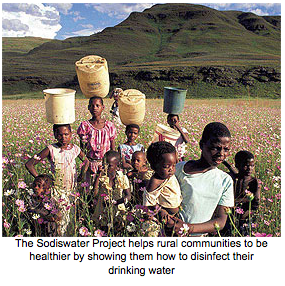 The Sodiswater Project has improved the lives of many rural communities who do not have access to clean running water. Using a free and easy method of disinfecting their drinking water through sun power, they have reduced diseases caused by unsafe water...
The Sodiswater Project has improved the lives of many rural communities who do not have access to clean running water. Using a free and easy method of disinfecting their drinking water through sun power, they have reduced diseases caused by unsafe water...
Helping others lead safe and healthy lives is the driving force behind a six-month journey by Liani Broodryk and Maria Botha. They are from the 'Ripples for Good' team and are travelling through South Africa to show communities how to disinfect their drinking water.
They visit deep rural areas where there is no running water and where communities have to use water from the nearest river or stream for drinking. This water is polluted and can spread bacteria, which cause diseases like diarrhoea and cholera.
The team uses transport like motorbikes, bicycles, canoes and donkey carts to reach their destinations. Sometimes they even have to walk.
Health benefits
The project, known as the Sodis-water Project, show communities how to disinfect their drinking water through solar disinfection. This means they make use of the sun's rays through a simple process. The method was developed by a microbiologist at the Council for Scientific and Industrial Research (CSIR) and has been approved by the World Health Organisation (WHO).
The process costs nothing and has huge health benefits as it helps to prevent diarrhoea, infections and other diseases carried by polluted water.
Reduce diseases
Many communities throughout the country have used the Sodiswater method successfully. Studies have proven that it has helped to reduce diseases in these communities. Fewer children, for example, were affected or died from diarrhoea, which is most often caused by drinking contaminated water.
Communities which have benefited from the Sodiswater method are encouraged to show their neighbours how to use it in their own communities. With a little effort they can prevent disease and save lives.
How to use the Sodiswater method
To use this method, all you need is the sun's rays and a transparent container like a plastic or glass bottle or bucket. Then just follow these simple steps:
- Fill your container with water.
- Close the container and leave it in direct sunlight for six hours.
- The ultra violet (UV) rays of the sun will kill disease-causing bacteria in the water.
- Once the water has settled, it is safe to use for drinking.
- Samona Murugan
- Bacteria - cells that contain germs and can spread disease in your body
- Solar - relating to using energy from the sun's rays
- Ultra violet rays - Invisible energy in the form of rays given off by the sun
CREDIT ADVICE SAVE FOR A BETTER TOMORROW
CREDIT ADVICE SAVE FOR A BETTER TOMORROW sadmin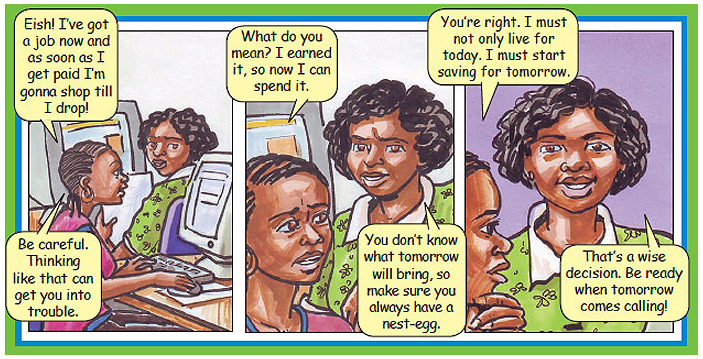
We are well into the new year. If you have passed Grade 12, this is the beginning of your career. You will be starting a new life at a tertiary institution of your choice or you will be starting a new job.
Now that you are on your own and have an income, you might be tempted to spend it on all the things your parents would not let you have before. Go slow. If you plan and save you can avoid getting into unnecessary debt. Saving will help you achieve your dreams.
Short- and long-term goals
Whether your dreams are big or small it is important that you save for them. When saving you need to have short-term and long-term goals.
For example, you can start saving for short term goals like buying a dress or a watch you always wanted, or you can save for long-term goals like buying text books for the next year of study. It will be helpful to write down your long term and short-term goals.
Personal budget
When starting to save it is important that you work out a personal budget. This will help you know where every cent goes, which, in turn, will help you manage your income better.
Within your personal budget you must put aside an exact amount that you need to save and make sure that you don't use it for any other expenses. Revise your budget regularly and keep your eye on the future.
Savings plan
When saving, it is important to know why you are saving. This will help you decide on the amount of money that you need to put aside every week or month.
It will also be best to decide where to save your money to get the best returns. You may have to use different savings products to help you meet your different goals. Find out about savings plans from your bank.
Stick to your plan
Remember, to reach your goals you must stick to your savings plan. Make saving a habit in your life. It will make it easier if you discuss your savings plan with your parent or close friends. The more you talk about it the more you can commit to it.
- Carol Netshifhefhe
For more information contact
Elizabeth Lwanga-Nanziri at 011 269 3789
or visit www.savingsinstitute.co.za
EDUCATION BEATS POVERTY
EDUCATION BEATS POVERTY sadmin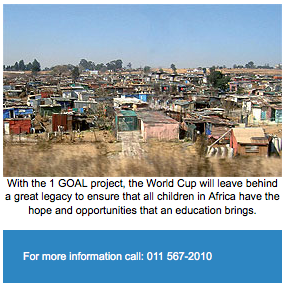 Some 75 million children around the world do not go to school due to poverty. Of these, about 33 million live in Africa. The eyes of the world will be on South Africa during the 2010 World Cup. Government will use this opportunity, through the 1 GOAL campaign, to raise awareness of the importance of education.
Some 75 million children around the world do not go to school due to poverty. Of these, about 33 million live in Africa. The eyes of the world will be on South Africa during the 2010 World Cup. Government will use this opportunity, through the 1 GOAL campaign, to raise awareness of the importance of education.
Education is the key to break the cycle of poverty for families and communities in South Africa, as well as the rest of the world.
1 GOAL: Education for All, which was started in August 2009, is a global movement to help ensure that every child will get an education. The 2010 World Cup will be used as a platform to promote the campaign.
Education for all
Governments along with world leaders and football teams participating in the World Cup have joined forces to promote the message of education for all.
1 GOAL's global team will voice a collective plea to world leaders to make a pledge of giving every child an education by 2015.
The message is that without education, disadvantaged children will never be able to beat poverty and realise their dreams.
Responsibility
Children who cannot go to school due to poverty, could be the next generation of doctors, leaders, sport stars or teachers. Unable to read or write, they face a lifetime of poverty, with no hope of a better life.
President Jacob Zuma added South Africa's name to the list of countries that are ready to tackle poverty through education.
"We have signed up to the 1 GOAL campaign because we believe that it is the responsibility of every government to make a commitment to tackle this indefensible situation," said President Zuma.
Great legacy
The 2010 FIFA World Cup was chosen as the platform to highlight the 1 GOAL campaign as it will bring together soccer fans, communities and players who can help spread the message.
Head of FIFA, Sepp Blatter, encourages all communities, businesses and individuals to come forward and let their voices be heard. Through the power of football, the 1GOAL campaign can achieve its goal, namely education for all.
- Samona Murugan
For more information call: 011 567-2010
EDUCATION BEATS POVERTY
EDUCATION BEATS POVERTY sadmin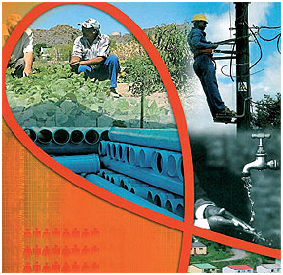 About 5,5 million people in South Africa are HIV positive and the number continues to rise. For many South Africans, this disease is destroying the dream of a better future. To help stop the spread of HIV and AIDS, a handbook was published as a guide for municipalities to deal with people infected...
About 5,5 million people in South Africa are HIV positive and the number continues to rise. For many South Africans, this disease is destroying the dream of a better future. To help stop the spread of HIV and AIDS, a handbook was published as a guide for municipalities to deal with people infected...
Framework for an Integrated Local Government Response to HIV and AIDS, is the title of the handbook issued by the Department for Provincial and Local Government. It is a guide which shows municipal leaders and officials what steps to take when dealing with HIV and AIDS in their communities.
This is in line with the department's aim of getting local municipalities involved in preventing the disease from spreading.
Challenges
The handbook helps municipalities to look at ways in which HIV and AIDS affect their ability to govern and deliver services effectively. Some municipalities have had some success in responding to the disease, but many are still facing challenges.
The handbook shows municipalities how to take action against the disease. Special attention is given to rural communities. This is where the disease spreads faster, because many people don't have access to health services and clean water.
Key areas
The handbook points out some key areas that need special attention. These include safe, reliable, and affordable access to municipal services, like water and sanitation, health, electricity and waste removal.
Government departments
The handbook encourages municipalities and rural communities to work together with all government sectors and departments to fight HIV and AIDS.
The following departments play a role in government's HIV and AIDS plan:
- Department of Health: ensures that HIV and AIDS prevention treatment and care, as well as support services are provided at every municipality.
- Department of Social Development: provides a social security net to help homes and households that are affected by the disease.
- Department of Housing: ensures all South Africans have access to secure housing, especially those affected by HIV and AIDS.
- Department of Land Affairs: promotes access to land and security for all homes affected by the disease.
- Department of Public Works: supports people affected by the disease through poverty-relief programmes.
- Department of Agriculture: promotes food security.
- Department of Transport: ensures that all households affected by the disease have access to health and social service points and that it is safe, affordable and accessible.
- Department of Water and Environmental Affairs: ensures that all homes, clinics, hospitals, etc have safe and affordable supplies of water and hygiene.
- Samona Murugan
ENERGY BRINGING POWER TO THE PEOPLE
ENERGY BRINGING POWER TO THE PEOPLE sadmin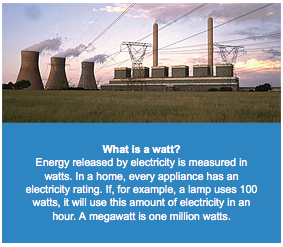 Eskom and the Department of Energy started a new building programme to create more electricity for new developments in South Africa. Electricity is an important part of progress and growth in the country.
Eskom and the Department of Energy started a new building programme to create more electricity for new developments in South Africa. Electricity is an important part of progress and growth in the country.
To keep up with our country's progress and growth, Eskom has plans in place to increase the number of megawatts (MW) onto its national electricity grid. This means that there will be more electricity to meet the demands of many people and communities.
The programme is made up of the building of three new power stations called Medupi, Kusile and Ingula.
Medupi
The Medupi power station is a project in Lephalale, Limpopo. The project is the largest construction in South Africa and will be one of the largest power stations in the world. The Medupi will be completed by 2012.
It will have six units and a total power of 4 800 MW. It will also be able to create electricity in areas where there is a shortage of water.
Construction of the Medupi will use large amounts of concrete, steel, water and coal. The parts and cement will weigh the same as seven super tankers which is about 250 000 tonnes.
Kusile
The Kusile is the second most advanced coal-fired power plant project in Eskom after the Medupi. Construction began in 2007 and will take about eight years to complete.
A new coal shaft will be built next to the power station to ensure that it has enough coal to operate.
Ingula
The Ingula is a pumped storage plan north east of Van Reenen's Pass in KwaZulu-Natal.
It has an upper and lower dam which both have more than 220 million litres of water supply. The dams are connected by underground water pipes and pumps.
When the energy demand is low, the water is pumped from the lower dam to the upper dam. Work has already started.
How will these projects benefit South Africa?
All the projects will contribute to the creation of new jobs. Workers will be needed for the next few years to complete construction of the three power stations. The project has already created jobs for more than 12 500 people on the construction site.
The project will also increase electricity supply on a large scale. This means that as the country continues to grow, South Africans will have a sufficient electricity supply for future needs.
Thousands of workers are being trained currently as Eskom, together with government, continues to empower the South African Dream.
- Samona Murugan
FLY THE FLAG!
FLY THE FLAG! sadminA free flag for you to print and cut out. Display it wherever you can. Remember the red band is always on top
FUN PAGE LET'S ALL BE 2010 AMBASSADORS...
FUN PAGE LET'S ALL BE 2010 AMBASSADORS... sadminPLEASE NOTE:
The games on this page are not a competitions. They are only for fun, so don't send your answers to Vuk'uzenzele.
2010 IS HERE AT LAST! After many months of hard work to prepare our country for the World Cup, we are ready and waiting for kick-off on 11 June! The stadiums and the infrastructure are completed and now we must all gear ourselves to welcome soccer fans to our beautiful country for the "beautiful game". Zakumi will bring some fun to the event; let's all follow his example - let's be friendly, proudly South African and good ambassadors for our country.
How can we be 2010 ambassadors?
We must all stand together to make this event a success. Fly the flag with pride; support the national team and wear your Bafana Bafana shirt on Fridays; learn to do the diski dance and teach others to do it with you; learn to sing the national anthem; and remember this World Cup is not only a South African World Cup, it belongs to all of Africa.
Crossword Puzzle
Use the clues on the right to complete the crossword puzzle.
Print the image below to complete this game...
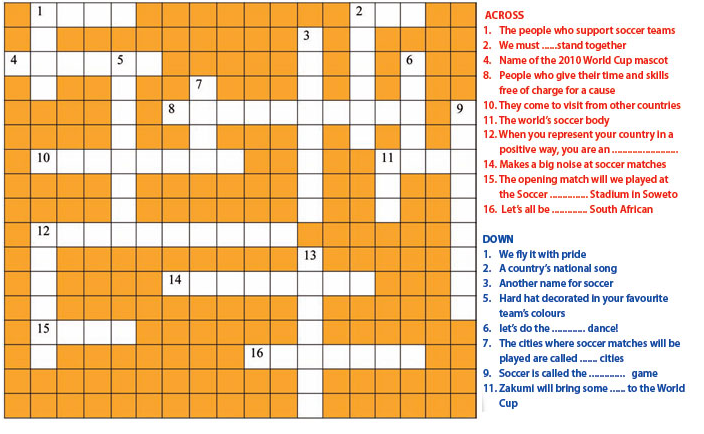
Fill in the Missing Words
Complete the sentences by filling in the missing words.
Print the image below to complete this game...
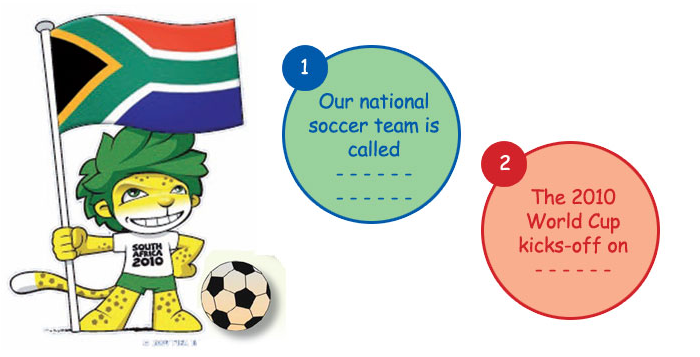
Free calendar
Free calendar sadminA free defense calendar for you to print and use.
KEEPING IT BRIEF
KEEPING IT BRIEF sadminLIMPOPO
A number of 2010 projects have been completed in Polokwane. These include the upgrading of the bus terminal, the widening and extension of a number of streets and the completion of a study to develop an intelligent transport system. A project to install a closed-circuit television (CCTV) network in the centre of Polokwane, which started on 30 March 2009 and is expected to be completed on 20 April 2010, is already 70 percent complete.
- BuaNews
MPUMALANGA
The final 2010 Visitor Information Centre (VIC), which will ensure that tourists arriving for the World Cup get the best advice and information, was opened in Nelspruit at the end of last year. This ended the Department of Tourism's national project to start such centres in five 2010 host cities. Other VICs opened since the start of the project are in Port Elizabeth , Polokwane, Rustenburg and Bloemfontein.
- Department of Tourism
KWAZULU-NATAL
Durban's transport system is putting final touches in place to accommodate visitors during the World Cup. A public transport call centre, which will give information to commuters and tourists on travel options within the city, is in progress. Phase two of the project, is already 95 percent complete. Construction work on Walter Gilbert Street, which will be the access route to the stadium, as well as pedestrian routes, a bus terminal, parking and the stadium entrance, is almost 70 percent complete.
- BuaNews
EASTERN CAPE
Port Elizabeth's Bus Rapid Transit (BRT) system is progressing well. Lanes for the system along Govan Mbeki Avenue are 70 percent complete and are expected to be completed at the end of January. Other BRT lanes in the city are expected to be completed by the end of February.
- BuaNews
NORTH WEST
As part of the province's preparations for 2010, the national Department of Transport is upgrading the temporary park-and-ride facilities in Rustenburg that were used during the Confederations Cup. The city will host six World Cup matches including England against the USA on 12 June and Ghana against Australia on 19 June.
- BuaNews
FREE STATE
Deputy President Kgalema Motlanthe recently visited households in Donkerhoek and Generations in Jacobsdal near Bloemfontein. He said he was satisfied with progress made since government's anti-poverty campaign was started in the area in 2008. The campaign does not only focus on ensuring that people have food on their plates, but also teaches them to produce their own food. In addition, it also ensures that they have identity documents to enable them to access government grants and other essential services.
- BuaNews
For more information about news items featured on this page, call 1020
LETTERS TO THE EDITOR GIVE US A PIECE OF YOUR MIND
LETTERS TO THE EDITOR GIVE US A PIECE OF YOUR MIND sadmin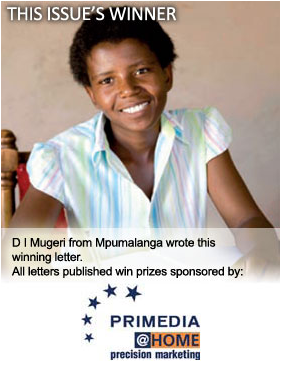 WINNING LETTER
WINNING LETTER
We are our own government
This is an era of "people for the government and the government for the people". South Africans should stop depending on the government and understand that as citizens of a democratic country we are the government. We are the ones who have to come up with ideas that will help boost the economy and help our country to grow.
We should make efforts to not only protect, but also enhance the government. We should not steal from the government. This does not mean that we tolerate corrupt officials that are representing us in the government.
It means if we work together we can fight corruption and help to create a better government that will benefit all of us.
- D I Mugeri, Dennilton, Mpumalanga
Be like a moving car
Let's fight challenges by being like moving cars. Let's put ourselves in forward gear in spite of problems - if we are like standing cars, we are not helpful. Through starting projects we can live better lives and create job opportunities for ourselves and other people. Stand up, get people together, talk to them and start a project together.
In my church we have started a beadwork project to spread skills to the church's youth. We are also going to fence the church yard and start our own vegetable garden to help needy people and orphans.
- Caroline Mbokiseng Moloi, Nqutu, KwaZulu-Natal
Stop demanding and blaming - start doing
We always demand, and when our government supplies, we are not satisfied, it is not good enough or we want more. People, let's stop demanding and blaming our government for everything that goes wrong, while we are sitting around doing nothing to change the conditions we complain about.
Let's start doing something like working together with government to make South Africa even better.
- Andile Mjiyakho, Utrecht, KwaZulu-Natal
Ignorance is killing us
It is not going to help our country if we continue to ignore issues affecting the state of our country.
People should make it their priority that they not only understand, but make an effort to solve issues like crime, HIV and AIDS and economic issues. Let us use our skills to help each other. It is not right to just watch your neighbour suffering if you can help.
Together we can do so much more.
- John Nkoana, Boyne, Limpopo
Make the right decision
Think twice before you make the final decision. Young people are faced with challenges especially at school and in their communities. Peer pressure is destroying their lives. Think how your behaviour will benefit your long-term goals. Think before you have unprotected sex; if you fall pregnant who will support that child and will you be able to go to school. Think before you start smoking; it is made clear that smoking causes cancer, so are you willing to risk your life just for a cigarette. Always strive to be wise and to take the right decisions for your own future - no one can make it for you.
- T C Ndlovu, Esikhawini, Kwa-Zulu Natal
It's OK to have dreams
We all have dreams. It's OK to have dreams and keep them in our hearts - they are special and admirable as they can help us to reach our goals. I have dreams of my own and I keep them warm and safe inside, only to wake them one by one when the time is right. One of them is 'peace and love in South Africa' and I know it's not too late. Let us work together on things that will brighten the future of South Africa.
- Shadrack Mboweni, Tembisa, Gauteng
Suicide is not a solution
Committing suicide can't solve any problems. If you have difficulties in your life, speak to someone úyou trust and share your problems with that person. There are counsellors and social workers in South Africa, who are trained to help you. Don't allow your problems to ruin your life. Believe in yourself, don't give up. Even if you are HIV positive, don't try killing yourself, because there is life after that - "speak out".
- Sibahle Mbangi, Sebokeng, Gauteng.
You can succeed even if you were born poor
Most of South Africa's teenagers have lost faith in themselves. They think that they will never succeed just because they were born poor. This has led them to engage in behaviour that will not benefit their future. These teenagers often end up being alcoholics, drug addicts and worst of all they practice unsafe sex that increase their chances of getting HIV and AIDS.
The youth of South Africa must realise that they are going to be faced with challenges. Just because you are poor does not mean that you are going to be poor forever. It just means that you have to work harder at school and use all the opportunities that are available to you.
- Atsile John Maupe, Morokweng, North West
Brighten the colours of our rainbow nation
The world is going through an economic recession which increases poverty. We are lucky to be in a democratic country, but it does not mean we can sit back and ignore our education or responsibilities. We must bear in mind that we are the leaders of tomorrow.
Let's not abandon our talents, but nourish them to brighten the colours of our rainbow nation. Let's not destroy ourselves, kill our souls and rob ourselves of the dignity we have by committing crime, smoking, drinking and doing drugs.
- Johanna Mathiane, Ga-Mushi Village, Limpopo.
It is not about how you look
These days people are judged by the way they look. The more beautiful you are the more you are taken seriously. This is not right. People should be judged on what they can do best regardless of how they look. If you can do something really well, if you are talented and work hard that is all that matters.
As South Africans we should love and respect each other. We should support those who have talents, but feel excluded because of the way they look. We should teach our children to love and not discriminate at all.
- Sabata Daniel Booi, Virginia, Free State
WRITE TO:
Vuk'uzenzele, Private Bag X745, Pretoria, 0001, or e-mail: vukuzenzele@gcis.gov.za.
If you don't want to have your real name published, you may use a different name, but you must include your real name and address to us.
PLEASE NOTE:
To win a prize, you must include a physical address and a contact telephone number in letters to us.
All letters will get a response.
OUR LEGAL SYSTEM JUSTICE FOR ALL
OUR LEGAL SYSTEM JUSTICE FOR ALL sadmin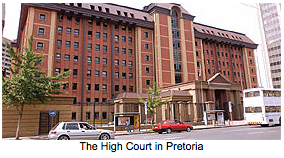 As part of continuing efforts to see that everyone has access to our legal systems, the Department of Justice and Constitutional Development has extended some services to rural and township courts.
As part of continuing efforts to see that everyone has access to our legal systems, the Department of Justice and Constitutional Development has extended some services to rural and township courts.
These changes will ensure the availability of more services that are presently found in district and magistrate's courts. As of August last year, the services offered by the lower courts (district and magisterial courts) were increased.
Maintenance orders
The new extended services allow the lower courts to have the status of other courts. These include access to civil and family law services in addition to hearing criminal matters.
The changes will see some of the rural and township courts also hearing maintenance matters. This will make life easier for those applying for maintenance orders since they won't have to travel long distances to courts situated in large towns for their applications to be seen to.
Small claims courts
In addition to this, government is also looking at other methods that will help strengthen the small claims courts. Some of the new methods will include addressing problems faced by the small claims courts. These problems include a shortage of staff, as well as insufficient security and training.
The Department of Justice and Constitutional Development is also looking at increasing the number of small claims court commissioners. In addition, the department will look at ways to reduce the time it takes to carry out orders or rulings of the small claims courts.
Checking fingerprints
To strengthen government's efforts in the fight against crime, the department has proposed changes that will allow police to use fingerprints stored by other government departments such as the Department of Home Affairs. These changes will allow the South African Police Service to check these fingerprints for criminal investigation purposes.
Regional courts
To speed up the hearing of cases, the Department of Justice and Constitutional Development started a project to decrease the number of cases that are yet to be heard in regional courts.
The project resulted in the appointment of magistrates, prosecutors, legal representatives and support staff to the regional court sites with the most backlog cases (longer than nine months on the court rolls).
By the end of March 2009, a total of 13 113 cases have been permanently removed from the regional court rolls as a result of the project. This included 8 855 cases that were finalised, as well as 3 649 cases which were withdrawn after reviewing of regional cases at backlog sites. The remaining 609 cases were transferred to other courts.
- Mbulelo Baloyi
PARENTS, BE INVOLVED IN YOUR CHILDREN'S EDUCATION
PARENTS, BE INVOLVED IN YOUR CHILDREN'S EDUCATION sadmin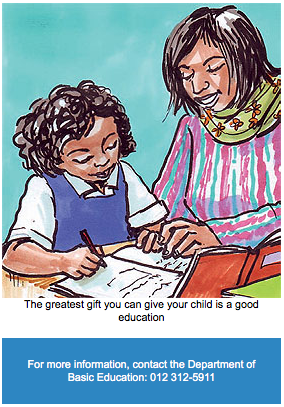 "It is through education that the daughter of a peasant can become a doctor, that a son of a mineworker can become the head of the mine, that a child of a farm worker can become the president of a great nation." - Nelson Mandela...
"It is through education that the daughter of a peasant can become a doctor, that a son of a mineworker can become the head of the mine, that a child of a farm worker can become the president of a great nation." - Nelson Mandela...
As parents, you have an important role to play in your children's education. This is the message of the newly-created Department of Basic Education.
The message is aimed at encouraging parents to be more involved in their children's education. This follows the Education Department's split into two separate sections. They are the Department of Higher Education and Training, which deals with tertiary education, and the Department of Basic Education, which deals with early childhood to matric education.
Education is the key
Government believes that education is the key in the war against poverty. The new administration has therefore made education an important priority. It will specifically pay more attention to those schools that have not been producing good results in the past.
A recent study at the University of Pretoria looked at why seven young black people were able to get doctoral degrees at South African universities during the apartheid years. This was a period when black people were not supported to excel academically.
The study found that behind every high performing student stood a supportive parent who valued the importance of education. The study also found that these supportive parents often did not have a good education themselves. What was common to all of them was the unshakable belief that the greatest gift they could give their children was a good education.
Working together
The Ubuntu teaching that it takes a whole village to raise a child will be the department's slogan, says Basic Education Minister, Angie Motshekga. This will encourage teachers and parents to work together to ensure that learners get the education and support they deserve.
Teachers will be encouraged to insist that parents check their children's homework daily and sign the homework books. They will also be encouraged to contact parents when learners are absent. Parents will be urged to co-operate with teachers and attend parents' meetings regularly.
Monitoring role
The department believes that parent involvement can also help to improve the way schools are run. This includes ensuring that the focus is on learning, that teachers and learners arrive on time and that teachers are in class every day and are well prepared for lessons.
To address the problem of poor results in some township and rural schools, the department believes that parent involvement will act as an early warning system long before the learners sit for their end-of-year examinations.
- Mbulelo Baloyi
PRESIDENTIAL HOTLINE PRAISE FOR SPEEDY RESPONSE
PRESIDENTIAL HOTLINE PRAISE FOR SPEEDY RESPONSE sadmin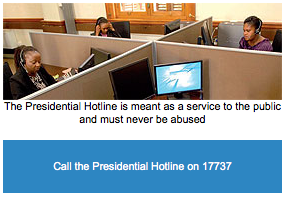 Hundreds of callers to the Presidential Hotline have nothing but praise for the way their complaints were handled after contacting the Presidential Hotline. These satisfied callers confirm President Zuma's statement that the Presidential Hotline is not only a public relations exercise. He said that each call would be treated as if it were the only one.
Hundreds of callers to the Presidential Hotline have nothing but praise for the way their complaints were handled after contacting the Presidential Hotline. These satisfied callers confirm President Zuma's statement that the Presidential Hotline is not only a public relations exercise. He said that each call would be treated as if it were the only one.
Satisfied callers who have written letters to thank the Presidential Hotline, include assistant pharmacists who didn't get a salary upgrade and pensioners who didn't get their grants.
Disability grant
In 2007, Amit Somaru applied for a disability grant for her mother, but the application was turned down. Somaru never gave up.
She continued to apply on behalf of her disabled mother without success. This changed after 14 September when a call to the Presidential Hotline, 17737, led to her mother now receiving her grant.
"I would like to thank you all and The Presidency for assistance in helping my mother to get her grant. The President's Hotline is one of the best things ever to come about," said Somaru.
Refunded
Johannesburg resident Thobeka Daki called the hotline to complain that City Power had been overcharging her for her lights account. After calling the hotline, City Power discovered the billing problem in her account. Daki was refunded the overcharged amount.
Free State assistant pharmacists Siphiwe Baloyi and Maphakisa Mosuwe had been trying to have their salaries upgraded since October 2008, but could not get help.
Within a few weeks after calling the hotline, the assistant pharmacists received their upgraded salaries. "We appreciate what the Presidential Hotline has done for us. This goes to show that our government is really determined to work for its people and solve our problems. We are very grateful," said Baloyi and Mosuwe.
Finger prints
Pretoria resident Angelique Fourie applied for an ID for her son Aubrey in May last year and heard nothing from the Department of Home Affairs until she called the Hotline in September last year.
After following up her complaint, the hotline told her that Aubrey had to have his finger prints retaken at the Centurion office of Home Affairs. "I was very impressed by your quick response and all the help you have given so far," said Fourie.
Case opened
Another caller, Caroline Mahlangu from Rosslyn in Pretoria also had praise for the way the Presidential Hotline helped her.
This was after local police failed to open a case against a stalker whom she said also watched her when she was bathing.
The local police said it was not a serious matter and they didn't open a case. A few days after reporting the matter to the hotline, Captain Manganyi from the Rosslyn Police Station met her and they opened a case against the stalker.
- Mbulelo Baloyi
ROLE MODEL HIS DISABILITY WAS NOT THE END OF THE ROAD
ROLE MODEL HIS DISABILITY WAS NOT THE END OF THE ROAD sadmin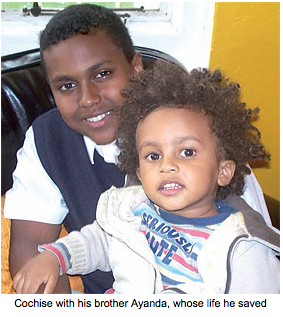 When faced with an emergency medical situation, even among adults, the first reaction is fear. It becomes worse when nobody has first-aid training. Whether it was sheer luck or pure chance, a first-aid book bought two months earlier prevented a near tragedy for a Johannesburg family.
When faced with an emergency medical situation, even among adults, the first reaction is fear. It becomes worse when nobody has first-aid training. Whether it was sheer luck or pure chance, a first-aid book bought two months earlier prevented a near tragedy for a Johannesburg family.
This was when a twoyear old boy Ayanda Jones almost drowned in the family pool in October last year. However, his10-year old brother Cochise knew exactly what to do. This was thanks to the pictures he had seen in a first-aid book bought by their father Andrew Jones in August last year.
Pulled him out
Cochise, then in Grade 5, had just finished doing his homework when it was discovered that Ayanda was missing. Cochise then saw the seemingly lifeless body of Ayanda floating in the shallow end of the family pool.
"Something just told me that it was Ayanda. I ran down to the pool, dived in and pulled him out," says Cochise.
Mouth-to-mouth
At the time, Ayanda had lost consciousness and his face had turned blue, an indication that there was not enough oxygen. Cochise quickly began doing mouth-to-mouth breathing into the airways of Ayanda.
"I remembered what I read in the first-aid book and began to apply it to try to breathe life into him," says Cochise.
He used his hands to press his brother's chest as he had seen in the book. Water started coming out of Ayanda's mouth. At that time his father arrived and they took Ayanda to hospital where he was saved and where Cochise was declared a hero.
- Mbulelo Baloyi
Tips on how to save a life
- First check if the patient is not breathing, but there is a pulse.
- Roll the patient on his or her back.
- Place the palm of one hand on the patient's forehead and the fingers of the other hand under the chin.
- Find out if the patient is breathing by placing your ear just above the nostrils and mouth. Listen for breathing while checking if the chest is moving. Feel for any air breathed out onto your cheek. Do this for 10 seconds.
- Ask someone to call an ambulance on 10177 or 112.
- If the patient is not breathing, breathe twice into the mouth, just enough to let the chest rise. If it is a child just blow over the nostrils and mouth.
- If the patient does not respond check the pulse on the neck or upper arm, holding two fingers on the area for 10 seconds.
- After this, if there is no pulse, start chest compression. Place one hand on the centre of the chest. Press down about five times.
- Breathe into the mouth, once after every five compressions until help arrives.